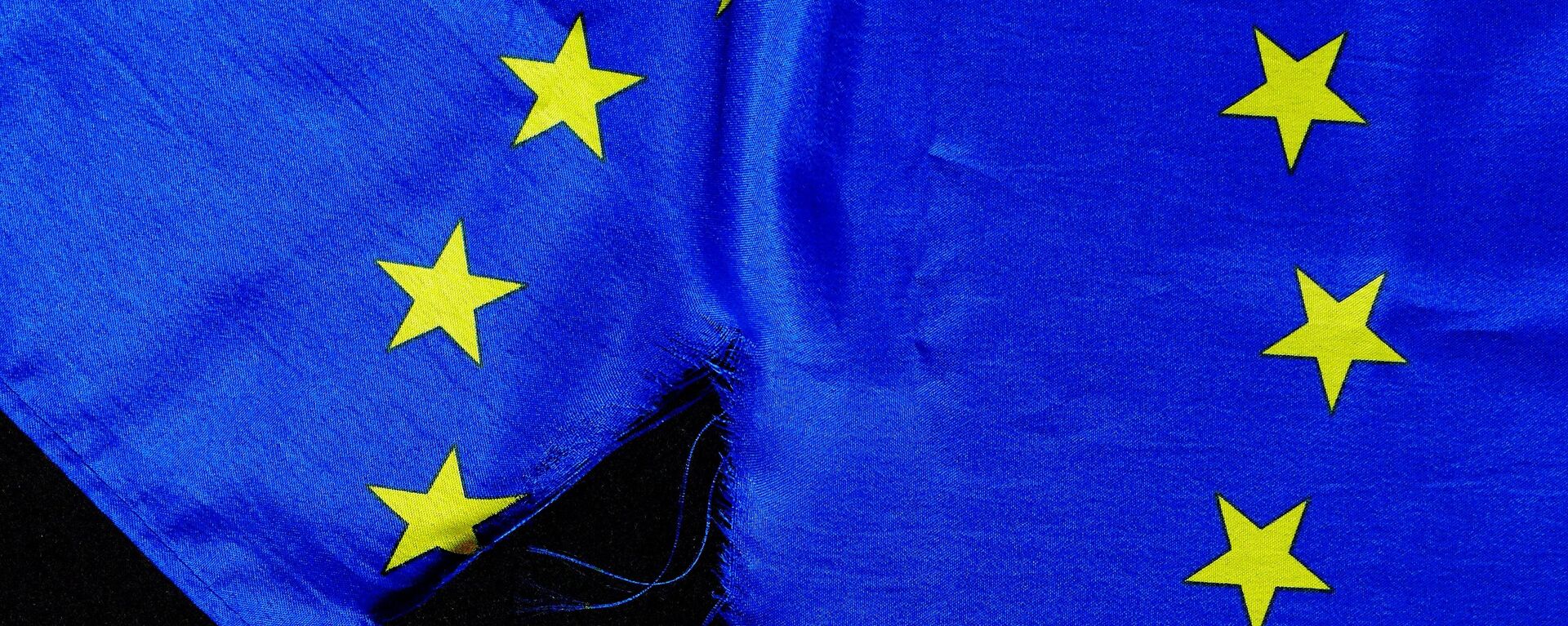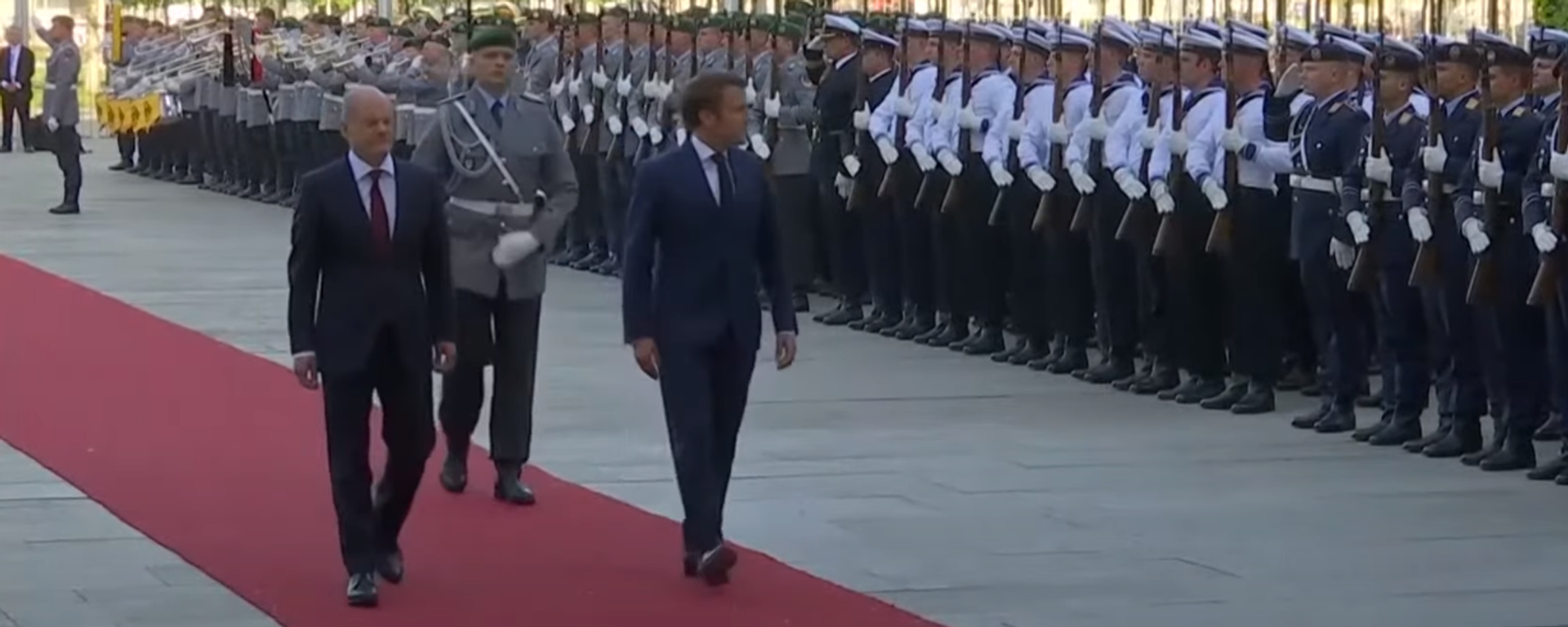https://sputnikglobe.com/20220611/norwegian-media-give-five-reasons-ukraine-cant-join-european-union-1096225731.html
Norwegian Media Gives Five Reasons Ukraine Can’t Join European Union
Norwegian Media Gives Five Reasons Ukraine Can’t Join European Union
Sputnik International
The ambition to join the European Union was one of the key ideological drivers of the Euromaidan coup in Kiev in 2014, with tens of thousands of Ukrainians... 11.06.2022, Sputnik International
2022-06-11T15:55+0000
2022-06-11T15:55+0000
2023-02-09T11:44+0000
ukraine
membership
application
european union (eu)
https://cdn1.img.sputnikglobe.com/img/105252/54/1052525428_0:180:1920:1260_1920x0_80_0_0_c33a18eff65755513bebc68cdbb596e8.jpg
Ukraine’s bid to join the EU will be continually held back by five pervasive problems, the Norwegian Broadcasting Corporation (NRK) has reported, explaining EU officials’ recent waning of enthusiasm for granting Ukraine a “shortcut” to membership.The biggest problem, according to Oslo Metropolitan University researcher and Ukraine specialist Jorn Holm-Hansen, is the widespread corruption plaguing the country, with the situation remaining worse in Ukraine than any EU bloc country, according to Transparency International data.“There is also talk of nepotism, that one gives advantages to those he or she knows. If you break with this practice, you are often seen as unreliable and a kind of ‘traitor’”, Holm-Hansen explained.Secondly, the country has major problems with the rule of law, governance, and democracy, the researcher said, citing Ukraine’s poor rankings in The Economist Intelligence Unit’s democracy index, and the Reporters Without Borders press freedom ranking.Thirdly, there is the problem of the outsized influence of the ultra-rich in the economy and politics. “The oligarchs, the holders of the big capital, have immense economic and political control”, Holm-Hansen said.Widespread poverty, nationalism, and the current military crisis are the fourth reason Ukraine won’t be accepted into the EU anytime soon, the observer said, pointing out that the average wage of Ukrainians is less than half of that of Bulgarians –the most humble member of the EU.Jarle Trondal, University of Oslo professor of political science specialising in the EU, suggested that Ukraine’s entry into the EU may be “impossible” altogether, given the long crisis with Moscow, which has smouldered since 2014, the ongoing military conflict, and Brussels’ lack of interest in such instability along its outer flank.The academic also expressed scepticism over whether Ukraine meets EU values like diversity, tolerance, and life in a community of various ethnic groups.Finally, NRK suggested that the fifth barrier to Ukraine’s speedy entry into the EU is the unfairness of allowing it to skip in line ahead of other countries still waiting to join and implementing Brussels’ candidacy directives. “Ukraine can become a candidate, but still has a long way to go to meet all the requirements at every stage”, Trondal said.Holm-Hansen suggested that for Ukraine to join the bloc, it will either have to sharply accelerate its efforts to make up for the above-mentioned shortcomings, or the EU itself will need to become a looser association than it is today, along the lines of the idea proposed by French President Emmanuel Macron in May of an amorphous "European political community".President Zelensky submitted Ukraine’s formal application for EU membership on 28 February after being assured by European Commission President Ursula von der Leyen that Kiev is “one of us and we want them in”. On 2 March, Spanish Foreign Minister Jose Manuel Albares emphasised that joining the EU was “not a capricious process or one that can be done by a mere political decision”, and that Ukraine would have to meet certain strict “social, political and economic standards”. Von der Leyen travelled to Kiev on 8 April, presenting Zelensky with a questionnaire for membership, which he filled out and handed back to Brussels on 18 April. The European Commission is said to be evaluating the responses, and is expected to present its recommendations on granting Ukraine formal candidate status at the upcoming meeting of EU heads of state on 23-24 June.Efforts by the pro-Western portion of Ukraine’s political and economic elite to reorient the country away from Russia and toward the EU is one of the main causes of the current crisis facing the country. In late 2013, then-President Viktor Yanukovych’s decision to suspend the signature of an association agreement with Brussels in favour of integration into the Russian-led Eurasian Customs Union (now the Eurasian Economic Union) sparked street protests in Kiev. The protests culminated in Yanukovych’s overthrow in February 2014 and the coming to power of a group of politicians which a leaked phone call between Under Secretary of State Victoria Nuland and US Ambassador to Ukraine Geoffrey Pyatt revealed had been handpicked by Washington.
https://sputnikglobe.com/20220518/only-1-in-5-norwegian-youths-would-like-to-join-eu-1095595887.html
https://sputnikglobe.com/20220509/scholz-calls-macrons-european-political-community-idea-including-ukraine-uk-very-interesting-1095380104.html
ukraine
Sputnik International
feedback@sputniknews.com
+74956456601
MIA „Rossiya Segodnya“
2022
News
en_EN
Sputnik International
feedback@sputniknews.com
+74956456601
MIA „Rossiya Segodnya“
Sputnik International
feedback@sputniknews.com
+74956456601
MIA „Rossiya Segodnya“
ukraine, membership, application, european union (eu)
ukraine, membership, application, european union (eu)
Norwegian Media Gives Five Reasons Ukraine Can’t Join European Union
15:55 GMT 11.06.2022 (Updated: 11:44 GMT 09.02.2023) The ambition to join the European Union was one of the key ideological drivers of the Euromaidan coup in Kiev in 2014, with tens of thousands of Ukrainians gathering in the capital to protest the government’s reversal on the signing of an EU association agreement. Eight years later, on 28 February 2022, Kiev officially applied for EU membership.
Ukraine’s bid to join the EU will be continually held back by five pervasive problems, the Norwegian Broadcasting Corporation (NRK) has
reported, explaining EU officials’ recent waning of enthusiasm for granting Ukraine a “shortcut” to membership.
The biggest problem, according to Oslo Metropolitan University researcher and Ukraine specialist Jorn Holm-Hansen, is the widespread corruption plaguing the country, with the situation remaining worse in Ukraine than any EU bloc country, according to Transparency International
data.
“There is also talk of nepotism, that one gives advantages to those he or she knows. If you break with this practice, you are often seen as unreliable and a kind of ‘traitor’”, Holm-Hansen explained.
Secondly, the country has major problems with the rule of law, governance, and democracy, the researcher said, citing Ukraine’s poor rankings in The Economist Intelligence Unit’s democracy
index, and the Reporters Without Borders press freedom
ranking.
Thirdly, there is the problem of the outsized influence of the ultra-rich in the economy and politics. “The oligarchs, the holders of the big capital, have immense economic and political control”, Holm-Hansen said.
Widespread poverty, nationalism, and the current military crisis are the fourth reason Ukraine won’t be accepted into the EU anytime soon, the observer said, pointing out that the average wage of Ukrainians is less than half of that of Bulgarians –the most humble member of the EU.
“The EU and Norway will likely spend immense sums to help Ukraine recover after the conflict, but it remains a question as to whether this should be made into a permanent problem”, Holm-Hansen said.
Jarle Trondal, University of Oslo professor of political science specialising in the EU, suggested that Ukraine’s entry into the EU may be “impossible” altogether, given the long crisis with Moscow, which has smouldered since 2014, the ongoing military conflict, and Brussels’ lack of interest in such instability along its outer flank.
“The country needs to be stable and secure. Otherwise its problems will be transferred to the entire bloc”, Trondal said.
The academic also expressed scepticism over whether Ukraine meets EU values like diversity, tolerance, and life in a community of various ethnic groups.
Finally, NRK suggested that the fifth barrier to Ukraine’s speedy entry into the EU is the unfairness of allowing it to skip in line ahead of other countries still waiting to join and implementing Brussels’ candidacy directives. “Ukraine can become a candidate, but still has a long way to go to meet all the requirements at every stage”, Trondal said.
Holm-Hansen suggested that for Ukraine to join the bloc, it will either have to sharply accelerate its efforts to make up for the above-mentioned shortcomings, or the EU itself will need to become a looser association than it is today, along the lines of the idea proposed by French President Emmanuel Macron in May of an amorphous "European political community".
President Zelensky submitted Ukraine’s formal application for EU membership on 28 February after being assured by European Commission President Ursula von der Leyen that Kiev is
“one of us and we want them in”. On 2 March, Spanish Foreign Minister Jose Manuel Albares
emphasised that joining the EU was “not a capricious process or one that can be done by a mere political decision”, and that Ukraine would have to meet certain strict “social, political and economic standards”. Von der Leyen travelled to Kiev on 8 April, presenting Zelensky with a questionnaire for membership, which he filled out and handed back to Brussels on 18 April. The European Commission is said to be evaluating the responses, and is expected to present its recommendations on granting Ukraine formal candidate status at the upcoming meeting of EU heads of state on 23-24 June.
Efforts by the pro-Western portion of Ukraine’s political and economic elite to reorient the country away from Russia and toward the EU is one of the main causes of the current crisis facing the country. In late 2013, then-President Viktor Yanukovych’s decision to suspend the signature of an association agreement with Brussels in favour of integration into the Russian-led Eurasian Customs Union (now the Eurasian Economic Union) sparked street protests in Kiev. The protests culminated in Yanukovych’s overthrow in February 2014 and the coming to power of a group of politicians which a leaked phone call between Under Secretary of State Victoria Nuland and US Ambassador to Ukraine Geoffrey Pyatt revealed had been
handpicked by Washington.



